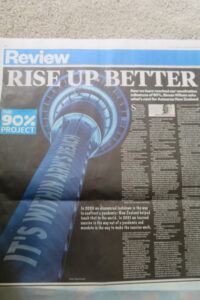Like many older New Zealanders, we have conscientiously listened to the Covid reports on TV or radio, and read the daily paper, to try and stay well-informed. And we are awaiting our booster shots.
 We find it hard to understand the anti-vaxx brigade, and even harder to feel tolerant of the bizarre parades and nasty banners – they remind us of the worst followers of Donald Trump during the USA election last year. The attacks on Jacinda have been particularly vicious at times – woman-hating in the extreme.
We find it hard to understand the anti-vaxx brigade, and even harder to feel tolerant of the bizarre parades and nasty banners – they remind us of the worst followers of Donald Trump during the USA election last year. The attacks on Jacinda have been particularly vicious at times – woman-hating in the extreme.
They seem to ignore the fact that New Zealand has been one of the most successful countries in the world at preventing the widespread hospitalisations and deaths from Covid we have seen so tragically in many other countries, including Australia and the United Kingdom.
Our daily read of the NZ Herald had become a real chore – day after day of case numbers and critical columnists, almost relentless negativity towards the government, apart from some of the epidemiology reporters …until today.
There are, today, three outstanding features in the NZ Herald- quite restoring our faith in the quality of journalism still alive there.
- First, a delightful double spread across pages 6 and 7 by Steve Braunias, headed The Word’s Most AWSOME CITY. His writing is always entertaining, sometimes very moving; this piece is one of his funniest, quirkiest, most enjoyable.
- Second, a thoughtful item by Claire Trevett in the business pages, The Politician of the Year – and the Rest. We don’t agree with everything she writes, but she is considered in her comments, and without nastiness.
- Third, and best of all, a double page spread, pp18-19, white print on black paper, RISE UP BETTER: The 90% Project, by leading journalist Simon Wilson.
First, he documents a wide range of responses to Covid within Aotearoa, thoughtfully and without invective, then describes a wide range of responses to the virus in other countries, and highlights some of the lessons we’ve learnt here, especially the way in which institutional racism has resulted in higher death rates in Maori communities.
As he writes: The lesson is plain enough: deciding what’s best for Maori should be done by Maori. Has 2021 brought us closer to understanding that?
And finally he looks at some of the other lessons we have learnt, and what we could do better in the future…
It can’t be said enough: what we’ve done in Aotearoa New Zealand is incredible, on the health and economic fronts. But if we want to rise up, it needs to be better again…
…and he analyses some of the changes we need. Finally (and I can’t think of a better way of finishing our newsletter):
And now its summer. Be kind. Have fun. Take care.
And then we’ll return, to the task of rising up better.
A truly inspirational double-page read – you can find it online on the NZ Herald website
 Earthsong Eco Neighbourhood
Earthsong Eco Neighbourhood Public Good
Public Good
Speak Your Mind